Turbulence in Macron’s France: A Recent History
by Nicolas Jara-Joly and Thierry Labica
5 July 2020
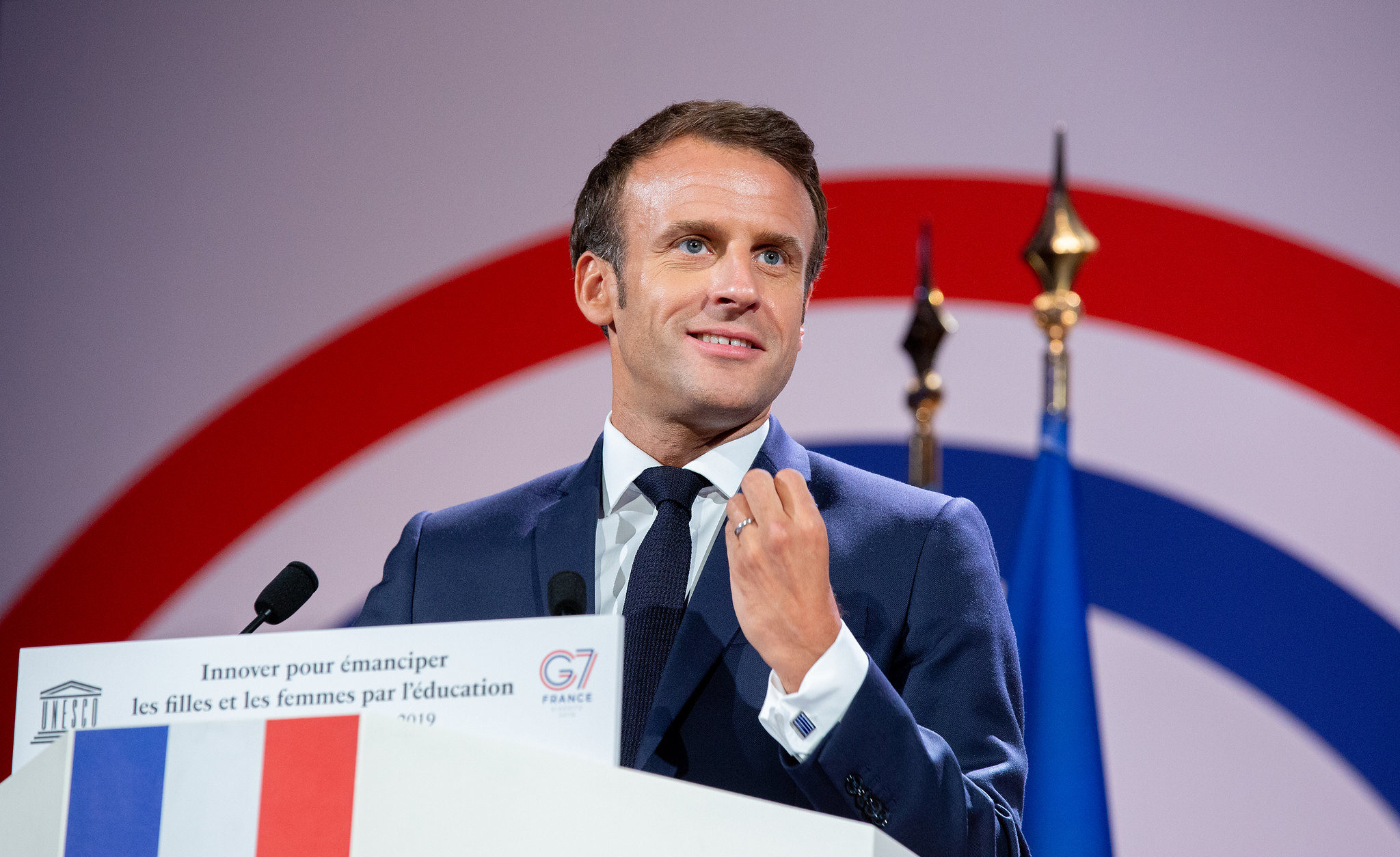
The French, perhaps typically, are not happy with their government. The trend of public support for the governments of many western countries, at least in the initial phase of the crisis, is one which has been almost entirely absent in France.
Admittedly, the French government’s handling of the public health crisis was something of a cock-up in terms of both communications and logistics; British readers will no doubt be familiar with the theme of masks which never arrive, tests that don’t work, and insufficient PPE and medical equipment in hospitals. What’s more, the pandemic and resulting lockdown measures happened to interrupt one of the biggest strike waves in recent memory.
France has managed to maintain a lower death toll than countries like the UK, and Covid-related controversies (along such lines as the Dominic Cummings scandal) have been less of a feature in French media coverage. Nonetheless, it is in France that public opinion has turned against the government most decisively. To understand this phenomenon and what it holds for French politics, it is important to understand the political developments under ‘La Macronie’ so far.
Macron en marche.
Public discontent with Emmanuel Macron has been rising steadily since his election in 2017, which occurred against a backdrop of wide-ranging political and social struggles beginning in 2016. That was the year left-wing public opinion broke definitively with the Parti socialiste (PS), the main centre-left party in France, over its revision of workers’ rights in what is now known as the loi El Khomri (El Khomri Act), which gave rise to the Nuit debout movement which occupied various squares across the country for over a month the same year. Bitter disappointment with François Hollande’s presidency and the disintegration of the PS in 2017 radically redrew the political landscape, with the newly formed La France Insoumise (LFI) emerging as a left-wing alternative to the discredited PS.
Meanwhile, Macron had been associated with the right wing of the PS but was still something of an outsider; his political project is probably best understood as the culmination of an agenda launched ten years earlier by Nicolas Sarkozy, France’s first openly neoliberal president, and matured and consolidated under Hollande and the cabinet of his right-wing prime minister, Manuel Valls, in which Macron served. (Valls, incidentally, is a man who would later go on to march alongside the Spanish right and far-right against Spain’s centre-left government in 2019.)
Macron’s election to the presidency in 2017 was predicated on the breakdown of the familiar political scene. That year’s presidential election was the first in over a generation in which neither of the two main parties – the PS nor an incarnation of the main centre-right camp, today Les Républicains (LR) – were represented in the second round of elections. Macron’s new party, La République en Marche (LREM), posed itself as occupying the centre ground, absorbing the right wing of the PS and much of its electorate while also syphoning votes from parties on the right. Meanwhile, what was left of the PS refused to get behind Jean-Luc Mélenchon of what was at the time the much more electorally viable LFI coalition, denying it the votes it would have needed to pass to the second round, and instead ensuring a run-off between Macron and Marine Le Pen, the far-right candidate, for the presidency. In the legislative elections later that year, LREM won 60% of available seats on a voter turnout of under 50%. In short, Macron was the main beneficiary of the political disillusionment of 2016 and the subsequent disintegration of traditional party lines; his victory in 2017 was all but total.

In 2018, industrial action was called by various trade unions (CGT, CFDT, SUD-Rail, UNSA) in response to the planned reform of the French national rail operator SNCF, and in particular the labour laws surrounding the status of rail workers. This happened to coincide with the emergence of a large student movement opposing the introduction of a new selective system (‘Parcoursup’) for the allocation of public university places. The former resulted in over 115,000 days of work lost to strike action, while the latter led to the occupation of dozens of universities across the country, including the Sorbonne, for durations of up to three months. It was during this period that the phenomenon of the black bloc rose to prominence in the French public sphere, with violent clashes taking place between police and protesters at every demonstration for months and causing much hysteria in the media. Despite the opposition, both reforms were passed via executive order from the president and the movements were simply crushed and then ignored.
Between a healthy majority in parliament, additional support from a further 80 or so MPs from LR, and a particularly weak parliamentary left throughout this period, Macron’s control over the political institutions since his election has been quite formidable. It was the gilets jaunes (yellow jackets) movement, which emerged rather suddenly in autumn 2018 and continued in strength for almost a year, that was the first to seriously threaten his power.
Sometimes misunderstood, the unifying feature of this multiform uprising was a visceral anti-elitist rage and demand for social and economic justice voiced across ‘forgotten’ working-class or lower middle-class sections of rural and semi-rural parts of the country. At its height, it is estimated that the movement consisted of between 280,000 and 3m people nationally, and without a doubt it represents the most innovative example of mass popular mobilisation in contemporary France. Public support for the movement remained high throughout, even despite the dramatic insurrectionary scenes at the Arc de Triomphe on 1 December 2018 and the periodic reemergence of violence well into 2019. At its lowest, support barely dropped below 50%, and at its peak it is estimated that up to three in four French people supported the movement.
The concessions Macron was forced into by the ferocity of the uprising were significant, amounting to what is often claimed to be €17bn in unplanned spending – principally in the form of bonuses and increasing the minimum salary by €100 per month, most of which was financed by an already planned tax cut to social security payments. Considered scraps by the gilets jaunes, this did little to attenuate the widespread rage felt towards the president and his politics.
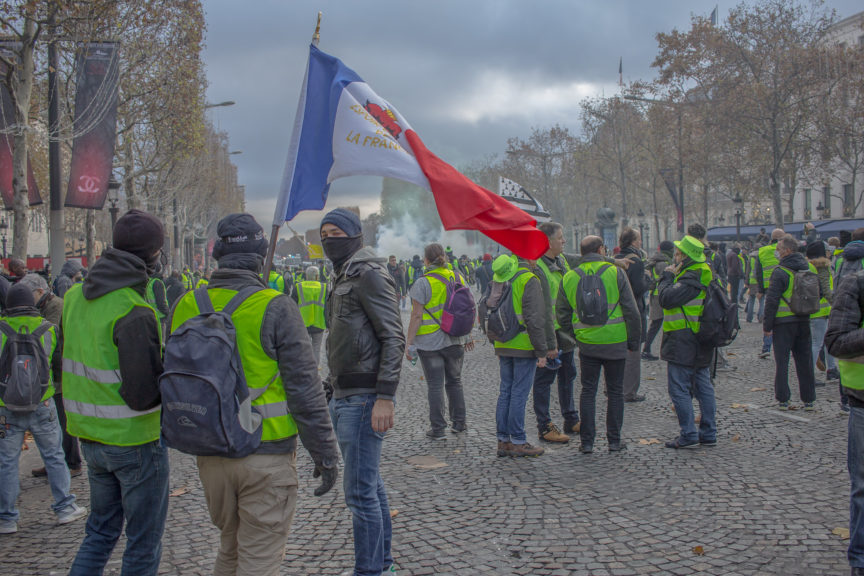
Ultimately, however, it was the strike movement against pension reform at the turn of 2020 which was most effective in galvanising opposition to Macron and his political project across French society. Opposition to pension reform united a multi-sectoral strike movement composed of, among other, transport workers, primary school teachers, secondary school pupils, barristers, music school teachers, Paris National Opera staff and ballet dancers, dockers, oil refinery workers, higher education staff and university students, Air France flight crews and employees of the public service broadcaster Radio France.
The standard bearer of the movement was a heroic transport strike which brought Paris and large parts of the country to a standstill for six weeks. Despite prolonged inconveniences for commuters and travellers across the country, opinion polls throughout the strike indicated a substantial majority of public support for the movement, as well as for the outright withdrawal of the pension reform bill itself.
All out for pensions.
Pension reforms have long been a vector of prolonged and militant opposition in France, serving as avatars for deeper expectations about social justice inherent in such issues as social security (which, in France, unlike the UK, comprises things like public health services and pensions). In 1995, opposition to the pension reforms and social security cuts of the Chirac-Juppé government resulted in the largest strike movement since May 1968, and as a result the project was quickly abandoned. Again in 2010, the pension reforms of the Sarkozy-Fillon government generated a wave of mass protests over a period of several months. On that occasion, however, the movement ended in defeat and the bill was passed.
Macron’s pension reform was designed to put an end to the post-war settlement of specific pension arrangements – régimes spéciaux, about 40 of them – and replace them with a single ‘points-based’ system. A handful of specific problems merit brief attention if we are to understand how opposition to this particular bill reached such a level of consensus across French society.
First, the reform not only does away with the existing checks and balances which ensure pensions compensate retired public sector workers for lower working-age salaries (one third of all jobs in France are in the public sector), but in getting rid of the régimes spéciaux entirely, private sector workers are also set to lose out. Second, the proposed reform is blind to the chronic problem of long-term unemployment among older workers (aged 50+), over a third of whom in 2018 had been out of work for more than two years and would therefore, under the new system, be required to remain in precarious work past the new retirement age of 64 simply to be assured a livable pension when they could finally afford to retire.
Third, the extremely technical obscurity and deliberate vagueness of government discourse regarding the future value of any accumulated ‘points’ has left those without the costly option of private insurance facing the prospect of permanent uncertainty about their future, never knowing exactly how much the points they would have acquired over the course of their working lives would actually be worth when it became time to convert them into real pensions.

Opposition to the reform was so fierce that barristers were seen blocking entry to courts, hospitals were on strike, ballerinas and opera performers were giving open air shows for free, and Macron couldn’t even go to the theatre without being hounded out of the building by crowds. In January 2020, the Conseil d’Etat, the highest legal advisory body of the executive branch, provided its own scathing review of the bill. In it, the council highlighted the legal flimsiness, inadequate financial forecast, and irresponsible attempt to push through – within an unworkable time frame – what actually amounted to a complete overhaul of a system which has, in the council’s own words, been “a major component of the social contract since 1945”.
Unfortunately, although the transport strike was able to force Macron to suspend plans to raise the full pension age from 62 to 64 in an announcement on 11 January, this concession gave the CFDT (one of the two largest union confederations) an opportunity to call an end to industrial action, fulfilling its now typical role as a so-called ‘moderate’ union, and weakening the strike movement just enough to give Macron the necessary leeway to pass the lion’s share of his reform through the first chamber of parliament.
La Macronie.
The image of Macron that has been presented by the media on both sides of the Channel is one of presidential youthfulness, progressive values, moderation and generational renewal. In France at least, this image is no longer credible.
Any description of the overall situation in public health (understaffing, low pay, hospital debt, closure of wards, promotion of corporate ethos), the planned privatisation of Paris’s airports, or the ending of nationalised rail in favour of private service provision, will be depressingly familiar to any British reader. Beyond the particularities that mark the French experience, the logic and development of ‘La Macronie’ generates a sense of déjà vu. It’s not without reason that images of Macron’s face superimposed onto Margaret Thatcher’s body were a recurrent feature at almost every demonstration throughout the strike movement.
Of the defining features of Macron’s presidency so far, there are at least three which require particular attention.
First, more than any of his predecessors, Macron has embodied the sentiment of upper-class contempt for the poor, the unemployed, ‘slackers’, ‘people who are nothing’, ‘illiterate workers’, ‘Gauls hostile to change’ and so on. His rhetorical preference for verbal aggression and humiliation reflects his unapologetically pro-rich, pro-big business politics, the epitome of which has been the scrapping of the wealth tax on financial assets (impôt sur la fortune), a move which directly benefited the 340,000 richest households in the country – roughly the top 1% of the national population.
Indeed, the political reasoning behind his flagship pension reform project was revealed avant la lettre by former right-wing prime minister, 2017 presidential candidate, proud Thatcherite and newly convicted embezzler François Fillon, while explaining something “no politician will ever admit” to an audience of business leaders in 2016: “The points-based system allows for one thing: the lowering of the value of the points each year and therefore a squeezing of pensions.”
As it happens, the chairman of BlackRock France, one of the world’s largest private asset managers, has just recently been granted the highest honour bestowed by the French state, the Légion d’Honneur. In January 2020, business paper Les Echos noted: “BlackRock makes no secret of its interest in private pension saving funds. And with good reason: they represent two thirds of its $7tn assets.” This glimpse into the logic of Macron’s reforms leaves little doubt regarding the social interests this president is intent on championing.
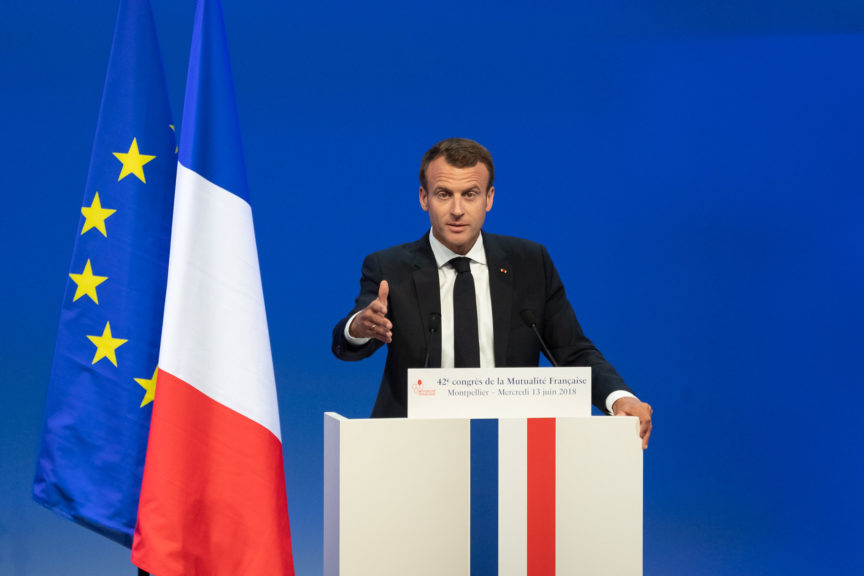
The second notable feature of Macron’s presidency is an unabashed disdain for democratic processes and parliamentary procedure. His chosen method for the transformation of labour law in 2018 and his attempt to push through pension reforms in 2020 are both a case in point. Faced with fierce opposition from within French society, in 2018 Macron proceeded to implement his transformation of labour law through the use of a constitutional manoeuvre known as ‘executive order’ or ‘government by decree’ (ordonnance), which compels an already subservient parliament to vote in favour of waiving its own deliberative responsibilities.
When once again confronted with obstruction in 2020, this time resulting from a multi-partisan opposition to the severe time restrictions (procedure accélérée) imposed on parliamentary debates regarding his pension reform bill, Macron resorted to invoking the controversial Article 49.3 of the constitution, which article allows the government to bypass parliament altogether and force a piece of legislation through without any need for parliamentary approval. Whereas the ordonnances in 2018 represented a deliberate show of strength, the use of Article 49.3 is widely considered an instrument of last resort and therefore an admission of political weakness. Indeed, public opinion was at such a low ebb for Macron during this period that there were even defections from LREM in anticipation of the looming municipal elections at the time. Both these cases remain clear reminders of the authoritarian and anti-democratic tendencies of the Macron presidency so far.
Which brings us to the third remarkable feature of Macron’s presidential record: the unprecedented levels of police repression used against demonstrators and adversaries. From ordering the raid of LFI offices and launching military assaults on the ZAD, to destroying gilets jaunes community cabins and arresting people for flying anti-Macron banners during lockdown, this will no doubt be the most memorable aspect of his presidency.
Due to his grip on the political institutions, Macron seems to have made a point of treating with open contempt all opposing ‘social partners’ (partenaires sociaux – unions, associations, etc). Indeed, Macron’s reliance on police repression to quell opposition is coterminous with a foreclosure of dialogue. This feature of Macron’s leadership style reached an apex of savagery during the gilets jaunes movement in which an estimated 1000-2500 protesters were seriously injured by police, of which 24 lost an eye, five lost a hand, and two – Zineb Redouane and Steve Maia Caniço – lost their lives. The weapon largely responsible for these lost eyes and hands, the LBD40 ‘flash-ball’ riot gun – considered a weapon of war by the UN – was shot a total of 13,900 times during the gilets jaunes movement. So far, during Macron’s presidency the police have seriously wounded more demonstrators than during the entirety of the last 20 years.
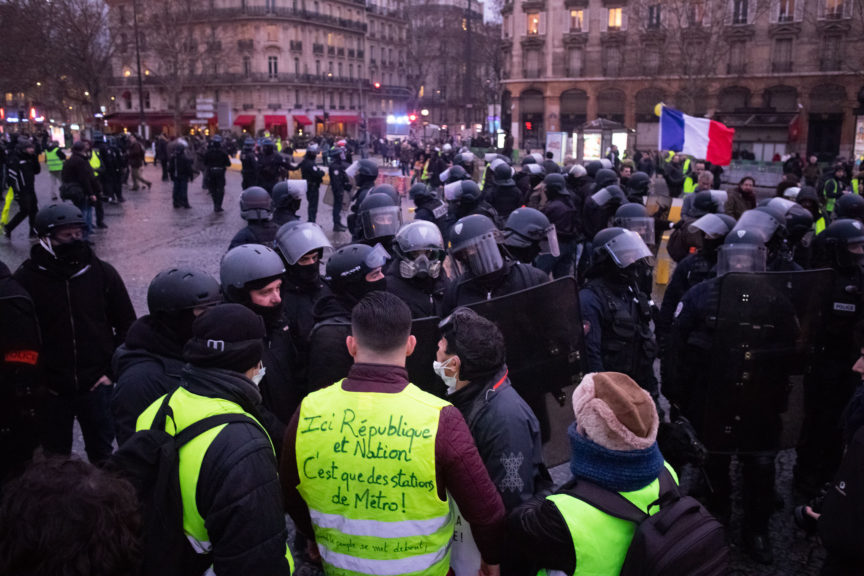
In light of this recent history, the effect of the coronavirus pandemic on Macron’s position is perhaps to be expected. We are now witnessing a weakening of his political capital and a general retreat on his political agenda in the face of the public health crisis – the arrival of which, it must not be forgotten, prevented him from completing the necessary political processes to pass his pension reform bill through the second chamber into law (it currently remains on stand-by in the senate, for now far too explosive to put back on the legislative agenda). As for the movements which have been amassing against Macron over the past two years, virtually overnight they were reduced to disenfranchised onlookers of a now thoroughly confiscated and vertical exercise of power, any momentum wholly interrupted by the emergency measures imposed by the state.
State of emergency.
The Emergency Act of March 2020, ushered in to “deal with the Covid-19 epidemic”, has produced a new and worrying mutation of the already existing state of emergency in France.
The magistrates’ union (Syndicat de la Magistrature) have labelled the powers entrusted to the prime minister and health minister by the act “exorbitant”, noting the all but complete absence of scientific or parliamentary safeguards to the new law. The government has decided for itself that the declaration of emergency did not require the backing of a scientific committee, and no parliamentary committee has been set up to scrutinise or assess the implementation of the new law either.
In short, there is nothing stopping emergency measures from becoming normalised. Recent precedent offers a stark warning: France’s last state of emergency was first declared as a three-month measure in the wake of the November 2015 terrorist attacks. It was then extended six times over the following two years, first by Hollande and then Macron, and despite its poor efficiency and its much criticised (including by the UN) corrosion of basic freedoms, since late 2017 most of its ‘temporary’ measures have now been integrated into permanent law.
As for the controversial Article 49.3, it would seem that we are likely to see it used much more over the next two years. Macron and now ex-PM Edouard Philippe formally lost their parliamentary majority in May following the decision by 20 or so LREM MPs to leave and create an independent parliamentary group.
Indeed, more than anything else, the current crisis has forced Macron into a public shift on his neoliberal agenda. Massive state intervention is back: since the beginning of the crisis, €400-500bn has been committed to supporting the economy (in the form of lost taxes, direct subsidies to businesses, guaranteed loans, etc). This shift is also discernible in government rhetoric: only six months ago, for instance, the privatisation of Aéroports de Paris was accepted as both inevitable and desirable. Today, no one in government is remotely close to publicly entertaining the idea, at least for the time being. There is good reason for such a tactical retreat: four months into the coronavirus crisis, France – along with Italy and Spain – appears to be set on one of the worst trends in the predicted global recession. According to OECD forecasts published on 10 June, contraction of French GDP in 2020 is expected to be in the region of 11.4-14.1%; meanwhile, as of late May, skyrocketing unemployment had reached 6m, roughly 15% of the working age population.
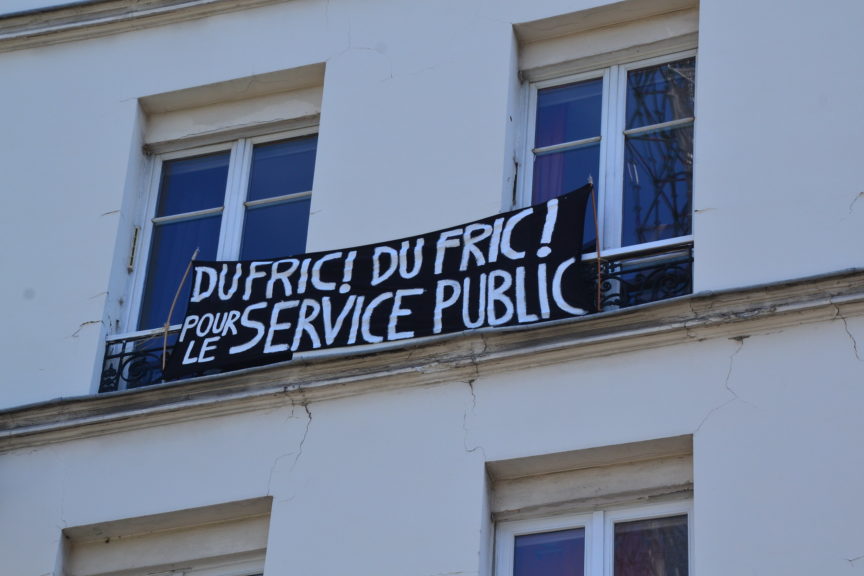
Scratch under the surface, and as we might expect Macron’s ideological foundations still remain firm. State interventionism may be back, but it would be foolish to think that it represents anything but an admission that such interventions are integral to the sustenance of neoliberal economies, as they have always been. France’s economic recovery is still more or less being planned by researchers from the Peterson Institute for International Economics, whose thinking has been a major influence on Macron’s economic policies since the very beginning of his mandate. (Indeed the researchers in question sit on the special committee set up by Macron for the elaboration of post-crisis policies.)
In the desperate attempt to ‘return to normal’, the state will be handing out vast resources to support private sector wages with the aim of preserving jobs, including a 30% wage subsidy to compensate for productivity losses. However – crucially – such bailouts come with no conditions attached, whether it be reducing wage differentials, ending or reducing dividends, promoting trade union rights or imposing stricter environmental regulations; it is clear in whose interests public funds are being used to save private companies. Meanwhile, right-wing thinktanks such the Institut Montaigne, and even more so the Medef (the French equivalent of the CBI) can safely be relied upon to continue lobbying for deregulation, lower corporation tax and lower social security contributions in the name of boosting business attractiveness and competitiveness.
Road to 2022.
With such a sudden change in the state of the economy and a corresponding – forced – shift in government rhetoric, Macron has been left in a quandary regarding his own electoral calculations for the now looming presidential election of 2022.
It is clear that urgent ‘social’ reforms are required to combat the onset of economic recession. In certain sectors this simply cannot be ignored politically, first among them public health – as the magistrates’ union pointed out when criticising the current emergency measures: “Why would exceptionality constitute an apt response to years of wilful neglect of public health policies which have indisputably compounded the ongoing crisis?” However, taking a ‘social reform’ approach would require Macron to shift to more of a centre-left ground and renounce any further contentious transformations of the French welfare state between now and 2022 – in other words, abandoning his political project.
On the other hand, it has been clear for some time now that Macron’s route to re-election really lies with the centre-right of France’s electorate, which would be decidedly put off by any pivot left. Those on the centre-left who voted for him in 2017, now possessing no illusions about his real politics, are unlikely to vote for him again in 2022, however many ‘social’ reforms he makes, and if Macron wants to take a big enough section of the centre-right electorate with him, he must champion their cause as publicly and as visibly as possible.
This is the context in which the recent resignation of the prime minister, Edouard Philippe, and the reshuffle of the cabinet should be understood. It is not uncommon for a president to change PM and reshuffle the cabinet halfway through a mandate, but it does usually signal both a communication strategy and a political manoeuvre in view of the next election. Politically, Macron appears to be eliminating any potential rivals to his 2022 bid, Philippe first among them. As recent polling shows, while Macron’s popularity has dropped dramatically since the strike wave and onset of the pandemic, Philippe’s has remained stable. The now former PM is simply too popular with the kind of centre-right electorate Macron needs to hoover up to be re-elected, and removing him from the national stage for two years before the next election prevents Philippe from becoming a viable electoral threat to Macron in 2022.
The new PM, Jean Castex, has no such political ambitions. At the level of strategic communications, the reshuffle is intended to demonstrate a reset in Macron’s political agenda for the next two years. Formerly the deputy general secretary of the Elysée under Sarkozy in 2011-12, Castex’s appointment shows us two things. Firstly, it is an attempt by Macron to reassert his authority post-Covid. The choice of PM usually embodies a set of political compromises contained within the president’s coalition; Castex, however, is the opposite of a compromise candidate. The appointment of an unknown technocrat to the head of government publicly reduces the office of PM to a simple executor of presidential decisions, and as such represents both a show of force and a concrete tightening of Macron’s grip on the institutions of government. Secondly, it sends a clear signal to the centre-right that he is in fact their candidate.
Indeed, having initially made a lot of noise about increasing funding for hospitals (and in particular for nurses, who have been demanding a wage increase for over a year) during lockdown, Macron has now settled on the compromise option of a one-off bonus and nothing more. Meanwhile, as universities are closed and unable to put up a fight, he has quietly put his pro-marketisation higher education bill back on the legislative agenda for July. What’s more, only a few days ago, and with astonishing levels of hubris even for him, Macron confirmed that pension reform will be put back on the legislative agenda after the summer. Take from this what you will, but either way, the rentrée in autumn is now certain to be a turbulent one.
Post-Covid left.
Beyond the immediate response to the crisis, and faced with deep uncertainties regarding the future development of the pandemic itself, leftwing projects for navigating a post-Covid world are finally taking shape.
In contrast to Macron’s yearning to retrieve the ‘normal’ order of things, consensus on the left is that the current crisis marks the necessary moment of departure from this very order. On this shared line, two notable alternative agendas have emerged. The first is L’Initiative commune (Common Initiative), launched on 14 May. It is a manifesto sponsored by a broad spectrum of centre-left groups, from Europe Ecologie les Verts (EELV) and the PS to elements of the Parti communiste. Later that same month, a 34-point manifesto was also published in the form of a Plan de sortie de crise (Plan for Exiting the Crisis), which is supported by a coalition of extra-parliamentary organisations and trade unions.
Although well-intentioned and supported by various important and entirely respectable intellectual figures and trade unionists, L’Initiative commune is a political project which seems to be principally – perhaps even exclusively – fixated on the 2022 presidential election. We are inclined to agree with the academic and anticapitalist activist Julien Salingue when he argues: “[L’Initiative commune] offers nothing more than the constitution of a ‘political alternative’ around the PS, Place publique, EELV and the more right-wing circles within the Communist party; an exclusively institutional project, which does not have a single word to say about the existing balance of power in society and the necessity of popular mobilisations.”
Further, the remarkable absence of a single figure from LFI on its list of signatories, the purpose of which is ostensibly to “unite the parliamentary left”, would indicate that internecine vendettas are still playing an important role. Indeed, considering the political figures driving it, one cannot help but think that more than a genuine attempt at unifying the left against Macron, L’initiative commune represents above all an attempt by the PS and others to relaunch their own ailing political careers whilst marginalising their bitter rival LFI – and above all Mélenchon – in the process.
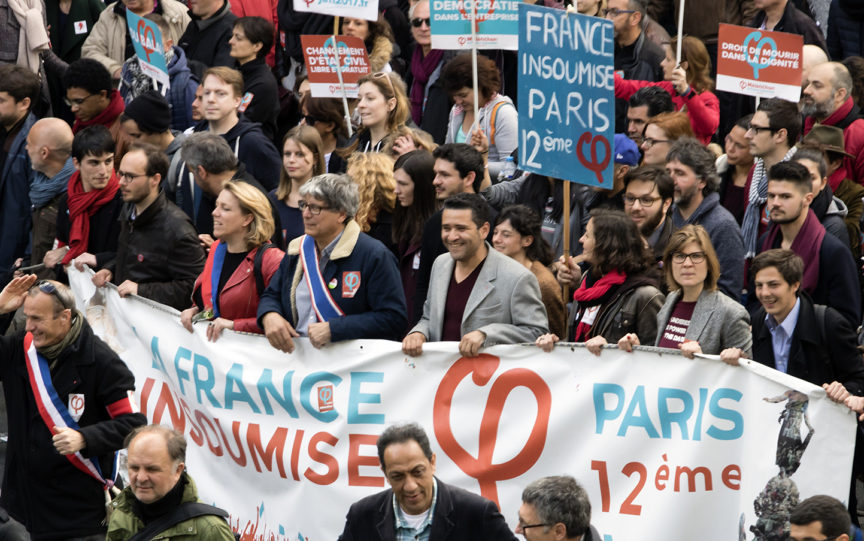
The Plan de sortie de crise takes a more radical position regarding the transition out of the present crisis, aiming towards a world of social justice and post-capitalist emancipation. While the document shares a number of concerns with L’initiative commune, there are some significant differences of emphasis: it is advanced in the name of activist and trade union networks (not individual political figures), it is much more explicitly class-oriented, and it asks the question which its counterpart appears to ignore: how do we get there?
It submits that social change, gender equality, environmental and social justice, and a renewed process of democratisation can only be the outcome of popular struggles and social movements, without which all the best intentions are bound to vanish into the cynical quicksands of party politics. The weaknesses of each document are the inverse of one another: for L’initiative commune the weakness lies in its exclusively parliamentary – some might say opportunistic – scope, whereas the Plan de sortie de crise arguably fails to attach its otherwise rather impressive programme from that very same sphere. The structure of this impasse reflects the historic weakness of the parliamentary left in France and, for now at least, the elusive nature of credible institutional and programmatic articulations which are compatible with the growing constituency of recent social movements.
The formation of LFI and Mélenchon’s presidential bid in 2017 represented such an attempt, but today the organisation is riven with internal disputes, and despite over a year of gilets jaunes mobilisation its presence on the ground as an organisation is virtually nil. Moreover, due to profound acrimony from across the left, LFI remains quite alienated from other important sections of the French parliamentary left. Mélenchon himself, for all his political merits and rhetorical skill, he is also part of the problem: his unrelenting grip on the levers of power in LFI, in an attempt to keep the coalition together, has ultimately led to a stifling of his own movement from within. Indeed, it is still unclear who the LFI presidential candidate in 2022 will actually be.
Although the second round of municipal elections, which took place on 28 June this year, offer a small glimmer of hope – LREM lost in almost every large or medium-sized city while Green candidates cleaned up across the board, even in rather unexpected places like Lyon, Bordeaux and Marseille – it remains the case that no coherent parliamentary expression of the recent social struggles has emerged which can seriously threaten Macron on the electoral terrains that matter most (presidential and legislative), and for the time being none seem ready to take the stage yet.
Rapport de force.
The recent anti-racist rallies, gathering tens of thousands of people in solidarity with the ongoing uprising in the US and against police brutality across France, have opened up a new and important political space. In the first instance, they have provided a much-needed political outlet for the riots against police misconduct which had already broken out sporadically throughout the lockdown in France’s poor, ethnic minority and immigrant areas (known as les quartiers populaires or banlieues). More than this, the protests have their base in a demographic which does not very often take centre stage in French politics: working-class young people of colour from immigrant backgrounds. Indeed, a large proportion of attendees at these rallies were not participants in any of the other movements we have already mentioned, and as such represent the activation of a chronically underrepresented political constituency in French society.
Finally, these protests have triggered, much sooner than anyone would have thought, the full resumption of mobilisations post-Covid: marches against planned higher education reforms, in support of healthcare workers, and in solidarity with undocumented migrants have all followed in its wake. Indeed, the recent show of support given by Philippe Martinez, the general secretary of the CGT (one of the biggest unions in the country) for a coalition of anti-police brutality organisations based in the quartiers populaires (chief among them the Comité Adama organisation at the forefront of the current anti-racist mobilisation) marks an important shift from the traditional political sensibilities of French trade unionism and provides some hope for the prospect of forging dynamic alliances across the left.
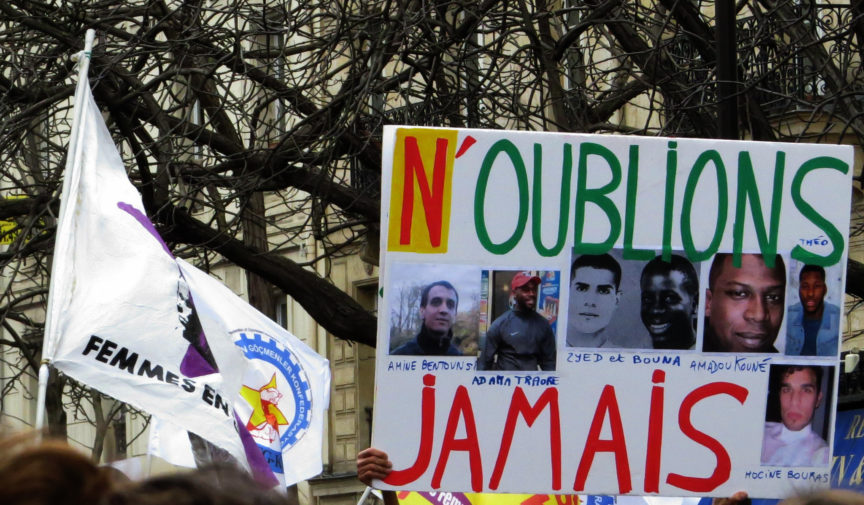
As in 2008, the situation in 2020 has provided validation for anti-capitalist critique and dealt a blow to the legitimacy of neoliberal ideology. The movements which have developed over the last few years have been intensely formative for a new generation of activists, organisers and grassroots leaders, and the convergences we saw between various different sections of the extra-parliamentary left during the movement against pension reforms show that such collaborations are possible and indeed necessary if we are to establish an effective rapport de force with the state, particularly when facing such an intransigent opponent as Macron.
Recent controversies regarding the extent of the racism present in the French police force will no doubt propel the anti-racist movement which is continuing to take shape, but it is still far too early to say exactly what will come of this particular mobilisation. One thing is for sure: Macron’s extensive use of police repression against everyone from striking firefighters and gilets jaunes to nurses and secondary school pupils means the normally quite marginal issue of police brutality has now much more potential to resonate across wider society than ever before.
Ultimately, the long-term political consequences of the social and economic fallout of the pandemic are still unclear, but if the last two years are anything to go by, Macron is in for a rough ride.
Nicolas Jara-Joly is a PhD student studying British politics and history at Paris X Nanterre and youth officer for Labour International’s NE France branch. Thierry Labica is a trade unionist and lecturer in English at Paris X Nanterre.